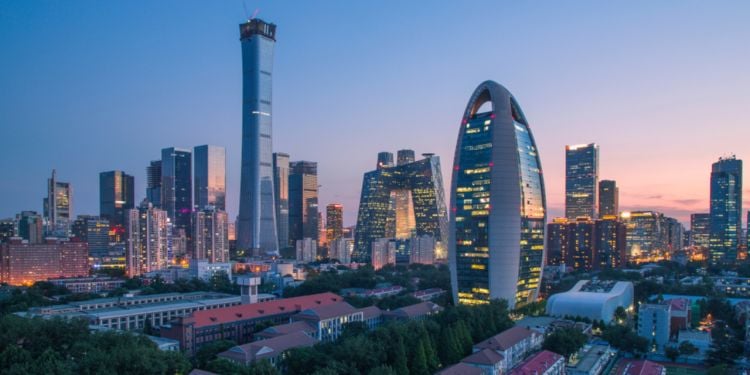
Beijing is the capital of China, and as the country's major city, it offers a wide range of opportunities for expat job seekers. If you want to work in media, technology, education, marketing, and more, you will find lots of work options in this city. The competition, however, is tough.
Important:
Since the COVID-pandemic, traveling to China and obtaining the needed visas and permits has become more difficult. Keep in mind that even if you secure a job offer in Beijing, you may need to wait until the situation changes before traveling to the country.
Beijing economy
Beijing, first and foremost, is China's political center — which is reflected in the city's economy, media, and educational establishments. The city's economy is mainly based on the service sector, accounting for over 71% of the country's RMB 2.8 trillion GDP. The city ranks 2nd in the list of top 10 Chinese cities by GDP, overtaken only by Shanghai.
High-end manufacturing, IT, media, and tourism are some of the key contributors as well. The city is home to the Chinese headquarters of multinational companies as well as local enterprises.
Due to its proximity to governmental offices, Beijing is also home to financial regulatory institutions, market watchdogs, and the headquarters of the People's Bank of China, the country's most prominent banking institution. Beijing has a highly-developed technical base and attracts a large number of high-growth startups as well as venture capital firms and investors. Agriculture plays an essential part in the economy, with the major farming areas located outside the urban districts and focusing on the cultivation of wheat and corn.
The job market in Beijing
As the country's capital, Beijing offers a variety of work opportunities in different fields. With that, it's also one of the most popular cities among expats in China, which makes the competition for certain positions very high.
In Beijing, you will be able to build your career in a variety of fields, like in most cities. Some of the most popular work fields for expats are technology, media, diplomatic relations, hospitality, teaching, etc.
If you work in IT, engineering, or manufacturing, you will find many international companies and local firms interested in hiring expat talent. There are two specialized areas in Beijing, where a lot of tech companies are based. The Beijing Economic and Technological Development Area (BDA) is home to companies specializing in material engineering, pharmaceuticals, electronic products, and more. Then, there is Beijing's Silicon Valley — Zhōngguāncūn Science Park. Here, you will find a lot of high-tech companies, including the offices of Intel, Microsoft, Google, and more.
Beijing is home to a lot of embassies and consulates. So, if you are pursuing a career in the diplomatic field, there is a high chance that you will be posted here.
China's major English language publications and TV stations are also headquartered in Beijing. This makes the city one of the best choices for careers in media. Here you will find the headquarters for China Central Television (CCTV), where you will find vacancies for editors, TV presenters, writers, and more.
Some of China's best universities are located in Beijing, including Peking University, Tsinghua University, Beijing Univesity of Technology, and others. A lot of higher educational establishments in Beijing have classes in English and hire foreign professors on both full-time and part-time basis.
Many events, international forums, conferences and exhibitions take place in Beijing. This opens up work possibilities in translation, interpretation, event management, etc.
English teaching remains one of the most popular professions for entering the Chinese job market. This is how a lot of expats start their career paths in Beijing before moving on to other jobs. However, since the introduction of the “double reduction” policy in 2021 (which aims to reduce the burden of extracurricular activities for Chinese students), a number of English training centers in the city have closed down. This means that the opportunities for English teaching in Beijing are currently limited, and the competition is higher than ever.
How to find a job in Beijing?
If you are job hunting in Beijing from outside China, the best place to start your job search is online. There are lots of websites that specialize in bringing together expats and employers in Beijing. Check out websites such as Echinacities, HiredChina, ChinaTeachingJobs, JobsDB, and others.
Another useful tool in remote job hunting is social media. Ensure your Linkedin account is fully updated and indicates that you are open to new opportunities. It is also a good idea to change your Linkedin location to Beijing so that your profile is more visible to employers and headhunters in the city.
If you are an experienced professional, your job search will be more efficient if you go through a hiring agency. There are several agencies in Beijing that specialize in matching expats with employers in the city, including Michael Page, BeijingRecruiter, Robert Half Talent Solutions, SHI Group, etc.
Yet another way to go about your job search in Beijing is to contact potential employers directly. You can look up companies in your field with offices in Beijing and check their website for potential employment opportunities. You can also reach out to their HR departments and inquire if there are any openings in the department you want to work in.
You can also check with employers in your home country. A lot of foreign companies have representative offices in Beijing. Finding a job in your home country first and then exploring relocation options may be one of the best ways to have job security in China's capital. Additionally, foreign companies typically provide their employees with generous relocation packages that include perks such as moving costs, accommodation, living expenses, education for children, tickets to fly back home for holidays, and more.
Before you set out on your job search in China, make sure to download the WeChat app. It's the number one app in China with over 900 million users and is used for most online communication in the country. WeChat is primarily a messenger app, but you can also use it for work calls, sharing documents, holding online meetings, setting up work group chats, and more. WeChat is also a social media, shopping and contactless payment tool.
If you want to search for work in Beijing when you are already in the country, you can still do all of the above. However, to work in China legally, you will need to apply for a work permit and residence — and the only way to do that is from outside of China. So, if you secure a job offer, you will need to travel back home and apply for a work visa before starting your employment.
Important:
Currently, you can only travel to China if you have a valid residence permit. You will also need to undergo a quarantine on your arrival. Make sure to check the latest entry requirements to the country before making any travel plans.
How to apply for a job in Beijing?
Applying for a job in Beijing is similar to applying for a job in most other Chinese cities. You will need to have your resume and cover letter ready when you start your job hunt. If you are applying for a position in an international company or a position where knowledge of Chinese isn't required, you can send your application in English. However, if you do speak Chinese, make sure to mention this in your application. If you have a good knowledge of Chinese, it may be a good idea to send out copies of your resume and cover letter in Chinese as well. Good knowledge of Chinese will substantially increase your chances of getting the job.
The next step in the application process will be a message or call from the hiring manager or your future employer. As we've mentioned above, make sure you download the WeChat app, as a lot of communication in China — including work communication — happens on the app. In fact, it's a good idea to add your WeChat ID to your application so that your potential employer can get in touch with you quickly.
If the employer is interested in your application, you will next go through a round of interviews. Note that if you are applying for work in a large company, you may need to interview with several department heads at different levels. If you are applying for work in a smaller firm, one or two interviews will probably suffice.
How to apply for a work visa to China?
The only way to work in China legally is to apply for a work visa. This is a three-step process:
- First, you need to apply for a work permit
- Second, you will need to obtain a PU a letter
- Finally, you can apply for the work visa itself.
Note that all work visas in China are classified into three categories: Class A (high-level talent), Class B (professional personnel) and Class C (non-technical and service workers hired for seasonal/temporary projects). The eligibility requirements, as well as the application process, may differ depending on the class of the working visa you are applying for.
The first thing you will need to start the job application process is to obtain a job offer. Having a valid work contract is essential for applying for a work visa in China. You will also need to make sure that your employer is capable of sponsoring your work visa. There are special requirements for companies in China that want to employ foreigners, and your employer will need to meet these requirements to provide you with a visa.
Once you have secured a work contract, you will need to ask your employer to send you an official invitation (work permit notice). You may also need to obtain a PU letter, which is an invitation that is issued by the China Foreign Affairs Office. As of June 15, 2022, applicants from the following countries don't require a PU letter: the United States, Austria, Croatia, Czech, France, Germany, Hong Kong, India, Indonesia and South Korea.
As the related requirements change frequently, make sure to check with your local Chinese embassy or consulate whether you need a PU letter to apply for a work visa.
Once you've collected the above documents, you can apply for the work visa itself. You can submit your application at your nearest embassy or consulate in China. Note that you will need to make an appointment first.
If your application is approved and you receive your work visa, make sure to check if all the information on your visa is correct, such as your name's spelling, type of visa, entry date, length of stay, etc.
When you have received your work visa, you will be able to travel to China. But while a work visa grants you entry into the country, it only allows for a limited stay. It is essential that you start your residence permit application process as soon as you arrive in China to make sure you complete your application in time.
Important:
Obtaining a work permit is the only way to work in China legally. With that, you may find job offers (especially in English teaching) that won't provide you with the needed documents. While quite a few expats in China do engage in such employment offers, the consequences for working illegally in China are severe. You risk facing heavy fines and deportation, and may even be banned from visiting China in the future.
Cost of living in Beijing
In Mercer's Cost of Living Survey of 2022, China's capital ranked the 10th most expensive city in the world. However, the cost of living in Beijing strongly depends on your lifestyle. If you rent a one-bedroom apartment on the outskirts of the city and watch your spending, you may get away on a monthly budget of under RMB 10,000 (under $1,500): you will pay around RMB 4,000 to RMB 5,000 for rent, and the rest for living expenses. If you want to live in the city center and prefer a typical expat lifestyle, your living costs will be substantially higher. A one-bedroom apartment in the city center will cost you around RMB 10,000. To manage your living expenses, try to get a position that will cover at least part of your accommodation costs and other living expenses.
When considering accepting a job offer in Beijing, make sure to factor in your potential living expenses.
What are the perks of living in Beijing?
You will like living in Beijing if you want to live in the capital city with a large expat community. There are lots of options in Beijing for after-work activities. You can explore the historical sights, trek the scenic trails on the edges of the city, enjoy a wide selection of commercial amenities, and more. Beijing has a continental climate with cold, windy winters and dry and hot summers.
One of the main drawbacks of living in the city is the high levels of pollution — especially during the winter months. In 2019, the city was classified as the 201st most polluted city in the world. If you do decide to settle in Beijing, be prepared to wear the N-95 anti-pollution mask during the most polluted days.
We do our best to provide accurate and up to date information. However, if you have noticed any inaccuracies in this article, please let us know in the comments section below.








